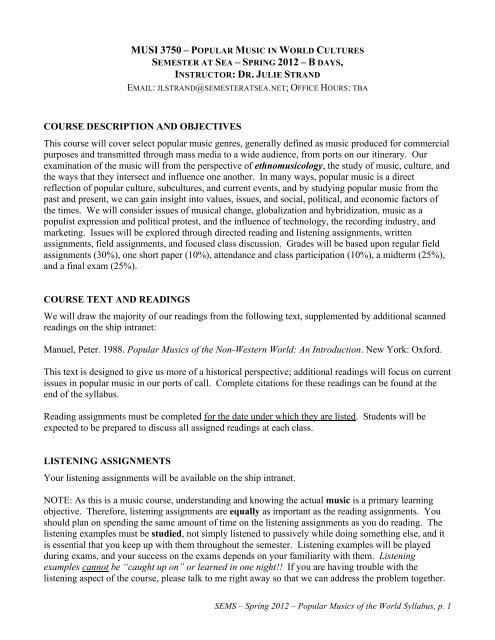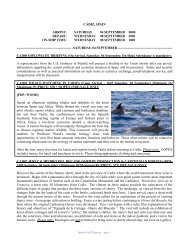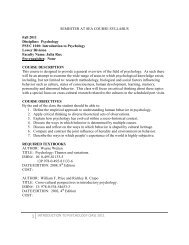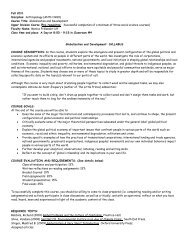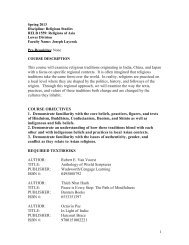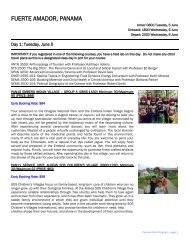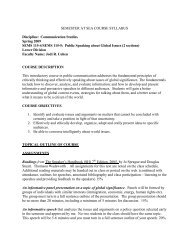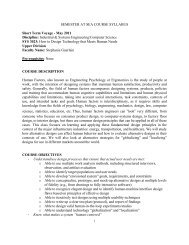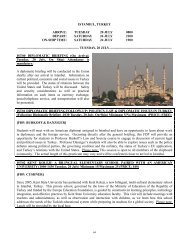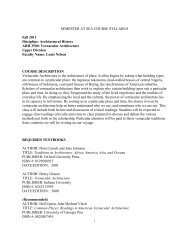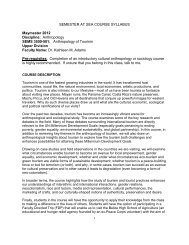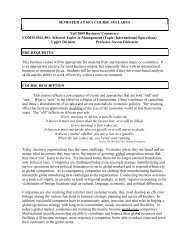MUSI 3570 - University of Virginia
MUSI 3570 - University of Virginia
MUSI 3570 - University of Virginia
You also want an ePaper? Increase the reach of your titles
YUMPU automatically turns print PDFs into web optimized ePapers that Google loves.
<strong>MUSI</strong> 3750 – POPULAR <strong>MUSI</strong>C IN WORLD CULTURES<br />
SEMESTER AT SEA – SPRING 2012 – B DAYS,<br />
INSTRUCTOR: DR. JULIE STRAND<br />
EMAIL: JLSTRAND@SEMESTERATSEA.NET; OFFICE HOURS: TBA<br />
COURSE DESCRIPTION AND OBJECTIVES<br />
This course will cover select popular music genres, generally defined as music produced for commercial<br />
purposes and transmitted through mass media to a wide audience, from ports on our itinerary. Our<br />
examination <strong>of</strong> the music will from the perspective <strong>of</strong> ethnomusicology, the study <strong>of</strong> music, culture, and<br />
the ways that they intersect and influence one another. In many ways, popular music is a direct<br />
reflection <strong>of</strong> popular culture, subcultures, and current events, and by studying popular music from the<br />
past and present, we can gain insight into values, issues, and social, political, and economic factors <strong>of</strong><br />
the times. We will consider issues <strong>of</strong> musical change, globalization and hybridization, music as a<br />
populist expression and political protest, and the influence <strong>of</strong> technology, the recording industry, and<br />
marketing. Issues will be explored through directed reading and listening assignments, written<br />
assignments, field assignments, and focused class discussion. Grades will be based upon regular field<br />
assignments (30%), one short paper (10%), attendance and class participation (10%), a midterm (25%),<br />
and a final exam (25%).<br />
COURSE TEXT AND READINGS<br />
We will draw the majority <strong>of</strong> our readings from the following text, supplemented by additional scanned<br />
readings on the ship intranet:<br />
Manuel, Peter. 1988. Popular Musics <strong>of</strong> the Non-Western World: An Introduction. New York: Oxford.<br />
This text is designed to give us more <strong>of</strong> a historical perspective; additional readings will focus on current<br />
issues in popular music in our ports <strong>of</strong> call. Complete citations for these readings can be found at the<br />
end <strong>of</strong> the syllabus.<br />
Reading assignments must be completed for the date under which they are listed. Students will be<br />
expected to be prepared to discuss all assigned readings at each class.<br />
LISTENING ASSIGNMENTS<br />
Your listening assignments will be available on the ship intranet.<br />
NOTE: As this is a music course, understanding and knowing the actual music is a primary learning<br />
objective. Therefore, listening assignments are equally as important as the reading assignments. You<br />
should plan on spending the same amount <strong>of</strong> time on the listening assignments as you do reading. The<br />
listening examples must be studied, not simply listened to passively while doing something else, and it<br />
is essential that you keep up with them throughout the semester. Listening examples will be played<br />
during exams, and your success on the exams depends on your familiarity with them. Listening<br />
examples cannot be “caught up on” or learned in one night!! If you are having trouble with the<br />
listening aspect <strong>of</strong> the course, please talk to me right away so that we can address the problem together.<br />
SEMS – Spring 2012 – Popular Musics <strong>of</strong> the World Syllabus, p. 1
COURSE REQUIREMENTS<br />
I. Attendance and Class Participation – 10%<br />
Your presence in class, both physically and mentally, is essential for satisfactory completion <strong>of</strong> the<br />
course. Material that is not covered in the readings will be presented in class, and the natural course <strong>of</strong><br />
our class discussions will determine relevant topics that will appear on exams. Additional music and<br />
video will be presented in class, all <strong>of</strong> which are fundamental to properly understanding the music and<br />
concepts we cover.<br />
You are expected to be in class prepared to discuss the assigned reading for the day. Everyone is<br />
required to contribute to class discussions, and I will occasionally call on students in order to equalize<br />
participation. Please help create a positive environment by respecting your fellow students, their<br />
thoughts, and comments by paying attention and refraining from talking or other disruptive behavior.<br />
This applies to when I am talking as well. Eating is also not allowed in class.<br />
Laptops, iPads, and any other electronic device will not be permitted in class. I do not care to<br />
compete with Facebook, photos, email, or blogs. All notes will have to be taken in class by hand.<br />
Attendance policy: Excessive absences will hurt your chances <strong>of</strong> performing well in this course. If you<br />
need to miss class due to an injury or illness, you must speak with me no later than the following class<br />
with the reason for your excuse and documentation from the health center. More than two absences in<br />
the semester will affect your attendance/participation grade and any unexcused absence will have a<br />
detrimental affect on your grade. Serious illness/injury and other extenuating circumstances will be<br />
dealt with on an individual basis. If you miss class, it is your responsibility to get the notes from that<br />
day from another student.<br />
II. Written Assignment – (5%) – Due B3 (Sun. Jan. 29)<br />
One short written assignment will be handed in early in the semester that will be designed to engage you<br />
with some <strong>of</strong> the relevant issues related to popular music as they apply to music that you are familiar<br />
with. By thinking about how music in our own lives reflects some <strong>of</strong> the same issues we will encounter<br />
throughout the voyage, we will be better able to see some <strong>of</strong> the commonalities among diverse popular<br />
music genres and cultures <strong>of</strong> the world. Specific details about the assignment will be covered in class.<br />
III. Field Component – Paper and Presentation (10% each, 20% total)<br />
Every student will be required to complete two FDPs associated with this course and complete and<br />
paper and presentation on them for the class. The field component <strong>of</strong> this course will be an opportunity<br />
for students to engage some <strong>of</strong> the issues and topics discussed in class with their experiences with<br />
popular music in various ports. Details regarding the nature <strong>of</strong> the activities, investigations, and analysis<br />
will be covered specifically in class. Experiences in the field will also help build personal adaptability<br />
and ways to develop strategies for negotiating a variety <strong>of</strong> cultural, linguistic, and geographic contexts.<br />
Your field reports/papers will be approached as ethnographies and will incorporate a combination <strong>of</strong><br />
course-related Faculty Directed Practica (FDP) and independent activities. Details about FDP’s and<br />
other port activities that can be used to satisfy the field component will be handed out separately.<br />
SEMS – Spring 2012 – Popular Musics <strong>of</strong> the World Syllabus, p. 2
REQUIRED FDPs:<br />
1. CAP10: Experience Cape Town Hip Hop from the Inside – Fri. 2/24 (day 1) 1-5pm<br />
2. CAP34: Jazz Music – Sat. 2/25 (day 2), 5-11:30pm<br />
FDP Paper/Presentation – both due on B11 (March 3)<br />
Due to the unavoidable situation that both FDPs are in the same port, this port will present a unique<br />
opportunity to conduct an in-depth, comparative study <strong>of</strong> two different genres <strong>of</strong> South African popular<br />
music. This project will draw upon both your experiences in the FDPs and material from course<br />
readings, discussions, and film viewings. This assignment will entail a written paper as well as an oral<br />
presentation with at least one media example supporting your presentation (i.e. audio or video<br />
example). Further details on field assignments will be distributed separately in class.<br />
** Please note: Any student who fails to complete this course's required faculty-directed<br />
practica, either as stipulated on this syllabus or, if that is for some reason impossible, as worked<br />
out in advance with the instructor, may fail the course regardless <strong>of</strong> her or his performance in the<br />
rest <strong>of</strong> the course.<br />
Late assignments: Late assignments will be subject to a 5% penalty for each day they are late. If you<br />
have extenuating circumstances and anticipate that you will not be able to hand in an assignment on<br />
time, please contact me before the due date, and we can discuss the possibility <strong>of</strong> an extension.<br />
Extensions will not be given on the day the assignment is due.<br />
IV. Quizzes – 4 total (10% each, 40% total)<br />
Four quizzes will be given in the following classes: B7, B12, B16, and B20. These quizzes will test you<br />
on your knowledge <strong>of</strong> the material we have been covering in class and reading/listening assignments.<br />
These quizzes will also help prepare you for the comprehensive final exam.<br />
V. Final Exam – Sunday, April 29, time TBA (25%)<br />
A comprehensive final exam will be given to test your knowledge <strong>of</strong> material covered in class and in<br />
assigned readings for over the entire semester. Exams will consist <strong>of</strong> a combination <strong>of</strong> multiple choice<br />
and short answer questions, with a listening section that will cover assigned listening examples. Further<br />
information on exams will be covered in class.<br />
GRADING SCALE<br />
A (93-100), A- (90-92), B+ (87-89), B (83-86), B- (80-82), C+ (77-79), C (73-76),<br />
C- (70-72), D+ (67-69), D (63-66), D- (60-62), F (0-59)<br />
SAS policy dictates that you must receive a final grade <strong>of</strong> C or higher to receive credit for the course.<br />
ACADEMIC MISCONDUCT / UVA HONOR CODE<br />
Please be aware that all students are required to adhere to the <strong>University</strong> <strong>of</strong> <strong>Virginia</strong> Honor Code as<br />
described in the Voyager's Handbook. Any and all acts <strong>of</strong> academic misconduct, including cheating,<br />
turning in work that is not one’s own, and all forms <strong>of</strong> plagiarism, will be taken seriously and pursued<br />
according to UVA regulations.<br />
SEMS – Spring 2012 – Popular Musics <strong>of</strong> the World Syllabus, p. 3
SEMESTER SCHEDULE<br />
Readings designated under the author “Manuel” are from the required text; all others are from the intranet readings.<br />
INTRODUCTION: WHAT IS POPULAR <strong>MUSI</strong>C? – LATIN AMERICA (CUBA AND BRAZIL)<br />
Class #<br />
B1<br />
Introductory/Brazil Readings:<br />
Manuel, Ch. 1, “Perspectives on the Study <strong>of</strong> Non-Western Popular Musics,” pp. 1-23<br />
Christopher Dunn, “Tropicália, Counterculture, and the Diasporic Imagination in Brazil,”<br />
pp. 72-91<br />
John Murphy, “Samba: Brazil’s National Music,” pp. 1-28<br />
Timothy Taylor, Ch. 1, “Popular Music and Globalization,” pp. 1-38<br />
Course introduction, Studying Popular Music<br />
[Port 1: Roseau, Dominica, Jan. 23-24]<br />
B2<br />
B3<br />
Popular Music and Globalization, Popular Music <strong>of</strong> Brazil<br />
Brazil: Tropicália, political subversion<br />
** First Assignment due – Popular Music, The World, and You **<br />
UNIT I: AFRICA<br />
[Port 2: Manaus, Brazil, Jan. 31-Feb. 3]<br />
Ghana Readings:<br />
Manuel, “West Africa,” pp. 84-94<br />
John Collins and Paul Richards, “Popular Music in West Africa (1981),” pp. 12-37<br />
E. J. Collins, “Ghanaian Highlife,” pp. 62-68<br />
Reebee Gar<strong>of</strong>alo, “Whose World, What Beat: The Transnational Music Industry,<br />
Identity, and Cultural Imperialism,” pp. 16-32<br />
B4<br />
B5<br />
B6<br />
B7<br />
Port reflections; Issues in Popular Music: Globalization, Cultural Hegemony<br />
Introduction to African Popular Music<br />
Ghanaian Popular Music: Highlife<br />
QUIZ #1; Ghanaian Popular Music: Hiplife<br />
[Port 3: Takoradi, Ghana, Feb. 13-17]<br />
South Africa Readings:<br />
Manuel, “South Africa,” pp. 105-106<br />
Louise Meintjes, “Paul Simon's Graceland, South Africa, and the Mediation <strong>of</strong> Musical<br />
Meaning,” pp. 37-73<br />
Gavin Steingo, “Historicizing Kwaito,” pp. 76-91<br />
Tim Taylor, “Ladysmith Black Mambazo: Two Worlds, One Heart”<br />
SEMS – Spring 2012 – Popular Musics <strong>of</strong> the World Syllabus, p. 4
B8<br />
B9<br />
B10<br />
South Africa – Paul Simon meets Ladysmith Black Mambazo<br />
South Africa – Music and Politics<br />
South Africa – Kwaito and Hip Hop<br />
[Port 4: Cape Town, South Africa, Feb. 24-29]<br />
B11<br />
B12<br />
South Africa FDP Presentations<br />
** Papers also due this day **<br />
QUIZ #2, Music <strong>of</strong> Mauritius<br />
[Port 5: Port Louis, Mauritius, Mar. 6]<br />
UNIT 2: INDIA<br />
India Readings:<br />
Manuel, “South Asia,” pp. 171-192<br />
Tim Taylor, “Anglo-Asian Self-Fashioning,” pp. 147-172<br />
Film Viewings (in class and on ship CC TV):<br />
There’ll Always Be Stars in the Sky (Bollywood documentary)<br />
Om Shanti Om (retro/modern Bollywood)<br />
Kandukondain Kandukondain (I Have Found It) (South Indian Tamil-language film)<br />
B13<br />
B14<br />
Bollywood: Film Music as Popular Music<br />
Indian Pop Music and Identity: Bhangra, etc.<br />
[Port 6: Cochin, India, Mar. 12-17]<br />
UNIT 3: SOUTHEAST AND EAST ASIA – VIETNAM, CHINA, AND JAPAN<br />
East/Southeast Asia Readings:<br />
Manuel, “Southeast Asia: Vietnam,” pp. 198-204<br />
Manuel, “China,” 221-235<br />
Manuel, “The Pacific: Hawai’i,” pp. 236-241<br />
Ian Condry, “A History <strong>of</strong> Japanese Hip Hop,” pp. 222-247<br />
B15<br />
Popular Music <strong>of</strong> Vietnam<br />
[Port 7: Singapore, Mar. 22]<br />
B16<br />
QUIZ #3, Popular Music <strong>of</strong> Vietnam, cont.<br />
[Port 8: Ho Chi Mihn City, Vietnam. Mar. 25-29]<br />
B17<br />
Popular Music <strong>of</strong> China – Shifting Identities I<br />
SEMS – Spring 2012 – Popular Musics <strong>of</strong> the World Syllabus, p. 5
[Port 9: Hong Kong to Shanghai, China, Apr. 1-7]<br />
B18<br />
Japanese Hip Hop<br />
[Port 10: Kobe to Yokohama, Japan, Apr. 10-14]<br />
B19<br />
Popular Music <strong>of</strong> Japan – Shifting Identities II<br />
B20 QUIZ #4<br />
B21<br />
Review/Catch-up day<br />
B22<br />
Popular Music <strong>of</strong> Hawai’i<br />
[Port 11: Hilo, Hawai’i, Apr. 25]<br />
FINAL EXAM – Sun. April 29, time TBA<br />
READING ASSIGNMENT SOURCES (not in the Manuel text):<br />
Collins, E. J. 1976. “Ghanaian Highlife,” African Arts 10(1): 62-68, 100.<br />
Collins, John and Paul Richards. 1989. “Popular Music in West Africa (1981),” in Simon Frith (ed.)<br />
World Music, Politics, and Social Change. New York: Manchester <strong>University</strong> Press, 12-46.<br />
Condry, Ian. 2001. “A History <strong>of</strong> Japanese Hip Hop,” in Tony Mitchell (ed.) Global Noise: Rap and Hip<br />
Hop Outside the USA. Middletown: Wesleyan <strong>University</strong> Press, 227-247.<br />
Dunn, Christopher. 2002. “Tropicália, Counterculture, and the Diasporic Imagination in Brazil,” in<br />
Charles Perrone and Christopher Dunn (eds.) Brazilian Popular Music and Globalization. New<br />
York: Routledge, 72-95.<br />
Feld, Steven. 2000. “A Sweet Lullaby for World Music,” Public Culture 12(1): 145-171.<br />
Gar<strong>of</strong>alo, Reebee. 1993. “Whose World, What Beat: The Transnational Music Industry, Identity, and<br />
Cultural Imperialism,” The World <strong>of</strong> Music 35(2): 16-32.<br />
Meintjes, Louise. 1990. “Paul Simon's Graceland, South Africa, and the Mediation <strong>of</strong> Musical<br />
Meaning,” Ethnomusicology 34(1): 37-73.<br />
Murphy, John P. 2006. Music in Brazil: Experiencing Music, Expressing Culture. New York: Oxford.<br />
Steingo, Gavin. 2008. “Historicizing Kwaito,” African Music 8(2): 76-91.<br />
Taylor, Timothy D. 1997. Global Pop. New York: Routledge.<br />
SEMS – Spring 2012 – Popular Musics <strong>of</strong> the World Syllabus, p. 6


